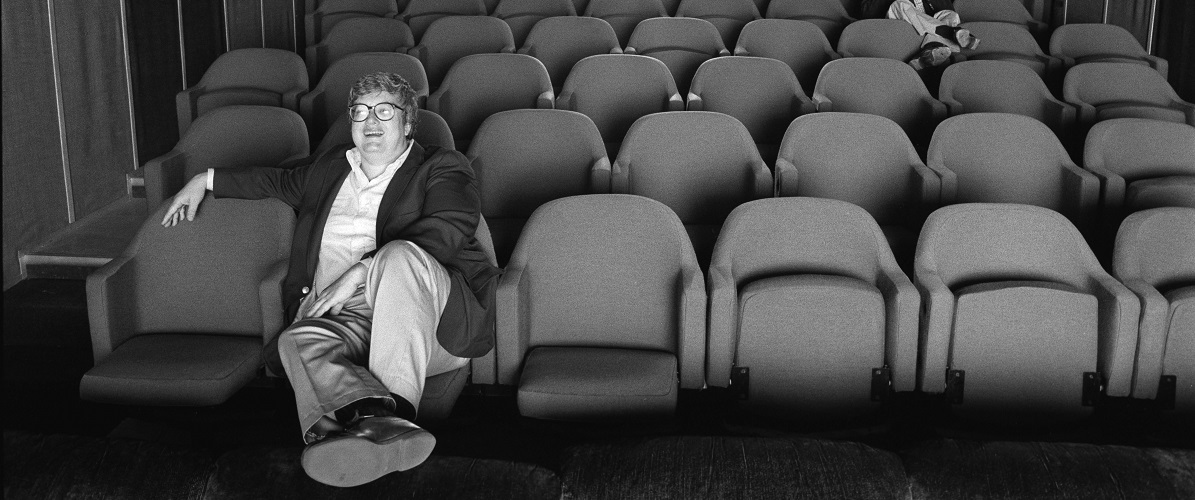By Chlotrudis Independent Film Society
Rating: 4.5 cats
Director: Steve James

Country: france, spain, united_states
Year: 2014
Running time: 120
IMDB: http://www.imdb.com/title/tt2382298/combined
Chris says: “From a contemporary viewpoint, it’s unexpected to discover that Roger Ebert had no academic background or concentrated expertise in film when he secured his post as The Chicago Sun-Times’ film critic in 1967. Of course, there were few college-level film studies programs at the time. As a serious, committed journalist, Ebert simply accepted whatever job he was assigned and likely allotted each one the same effort and consideration in fulfilling his duties as a writer and reporter. It’s not hard to argue that Ebert made film his life’s work, even before he became a celebrity via the weekly movie review television series he co-hosted with his hometown rival, The Chicago Tribune film critic Gene Siskel. And yet, this documentary, directed by Steve James (HOOP DREAMS), might not exist had Ebert not kept such a high profile while publicly battling cancer for the last seven years of his life.
“Much of the film is loosely adapted of Ebert’s 2011 memoir of the same name. An off-screen narrator reads sections of this text, which is fleshed out with archival photos and interviews from newspaper colleagues, fellow critics, producers, filmmakers and Ebert’s wife, Chaz. As a framing device, James periodically inserts footage he shot of Ebert in the last six months of his life, mostly in his hospital room and at rehab. Even though Ebert’s radically altered appearance is well-known, it’s still shocking to see him like this, especially compared to the iconic, rotund, bespectacled Midwesterner one remembers from his TV show. But his presence does not inspire pity or feel exploitative, for if a pattern emerges throughout his life’s story, it’s that he lived it as deeply as anyone could. His passions naturally included movies and writing about them, but also reading, storytelling, drinking (until he gave it up in his late thirties), traveling, and once he met his wife, love and family.
“LIFE ITSELF celebrates Ebert for all his achievements and attributes, but also recognizes his other, less perfect qualities too, as any well-rounded portrait should. The film’s most entertaining section is a series of SISKEL AND EBERT outtakes where he and Gene verbally spar with each other, each man dishing out snarks towards the other but with an uproariously ‘professional’ passive-aggressiveness that gets to the heart of why their anti-chemistry made for compelling TV. It’s refreshing to hear one of Ebert’s longtime colleagues say, ‘Roger was a nice guy, but he wasn’t that nice.’ Reconcile that with the affable thumbs-up guy persona he cultivated so well via such pursuits as a 1980s documentary he made about the Cannes Film Festival or the popular blog that became his voice after cancer took away his speech. Sure, he wasn’t the best or most innovative critic of his time—a few interviewees acknowledge as much, and perhaps the film could’ve used even more of this dissent. Still, just imagine a world without Roger Ebert. As a populist, he brought film criticism to a wider audience than anyone else before (or arguably since). One comes away from this film comprehending the sincerity with which he did this and in how he approached both a memorable life and inevitable death. 4.5 cats”
Bruce says: “Roger and I were in the same class at the University of Illinois. I met him the first week of school as we both were chosen to be in Freshman Seminar, a weekly discussion group of forty students that promoted analysis and debate – informal and impromptu as we never knew what the topic of the evening was going to be in advance. The challenge was to make us develop quick thinking and unique perspectives.
“Roger’s talents were evident from our first session. He was fearless, sharp and amazingly persuasive…..and always a character. I do believe he thought a lot about film at an early age. Throughout our many weeks at Freshman Seminar Roger referenced many films to score his points wile others relied exclusively on literature or current events.
“We were on Student Senate together in our Sophomore Year. In the following years he devoted most of his extra curricular time to the Daily Illini and our encounters became gradually scarce. The last time we met was in the Old Town Ale House, the sleazy after hours bar he frequented in Chicago. I stumbled in on my way home and ran into him. In all likelihood our conversation was incoherent.
“I had planned to stop by and see Roger at a book signing several years ago at the Toronto International Film Festival. When I arrived a notice had been posted that the event was canceled for health reasons. I was quite blue to have missed him.”
LIFE ITSELF is an excellent tribute to both the man and his career. Personally I feel there should be more in the film about his criticism. When he wasn’t pandering to Hollywood, he often wrote wonderful reviews. In particular I appreciate his efforts to emphasize the good in each film he reviewed rather than going on all out witch hunt for the bad. While I was never a big fan of his TV show, I did get an occasional kick out of it.”
